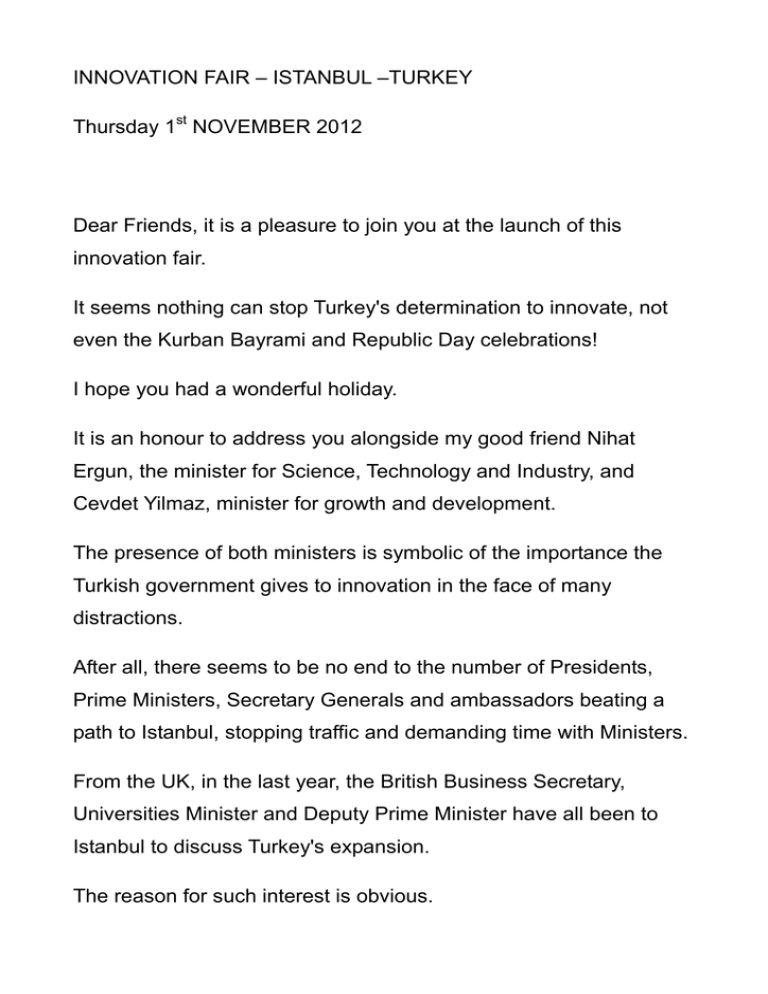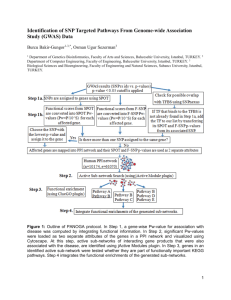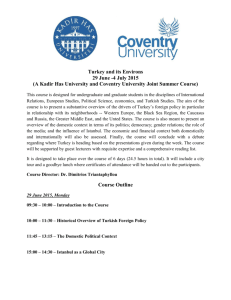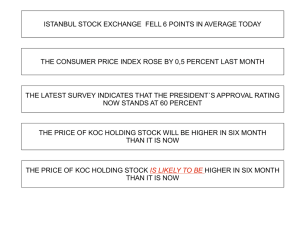INNOVATION FAIR – ISTANBUL –TURKEY Thursday 1 NOVEMBER 2012
advertisement

INNOVATION FAIR – ISTANBUL –TURKEY Thursday 1st NOVEMBER 2012 Dear Friends, it is a pleasure to join you at the launch of this innovation fair. It seems nothing can stop Turkey's determination to innovate, not even the Kurban Bayrami and Republic Day celebrations! I hope you had a wonderful holiday. It is an honour to address you alongside my good friend Nihat Ergun, the minister for Science, Technology and Industry, and Cevdet Yilmaz, minister for growth and development. The presence of both ministers is symbolic of the importance the Turkish government gives to innovation in the face of many distractions. After all, there seems to be no end to the number of Presidents, Prime Ministers, Secretary Generals and ambassadors beating a path to Istanbul, stopping traffic and demanding time with Ministers. From the UK, in the last year, the British Business Secretary, Universities Minister and Deputy Prime Minister have all been to Istanbul to discuss Turkey's expansion. The reason for such interest is obvious. There are few countries with the current growth, or the potential for further growth, that Turkey has. People naturally want to take advantage of this. But my message today is slightly different. For sustainable growth to continue, products, processes and technologies have to be developed here in Turkey. This is where value must be created, not just added. The role of outsiders should be to act as co-operative catalysts to domestic innovation, which will benefit all of us. The challenge is how to make that happen. The good news is that Turkey has made huge progress in innovation in the last decade. Research and development spending has doubled as a share of GDP. There are fifty thousand more full time R&D researchers. Crucially, this growth in innovation hasn't just been about the state spending more. The private sector's share of research and development spending has quadrupled in just seven years. As a result, the number of domestic patents has increased by more than ten times. Nor are you satisfied with your achievements. The Prime Minister's recent announcement of extra help for “angel investors” will help many of the exhibitors at this fair attract investment. This will help Turkey reach the Vision 2023 targets of a two trillion dollar economy and five hundred billion dollars in exports. But innovation is about more than just economic growth. Innovation is the most practical path we have to a better, more secure, safer, more prosperous future. This is a grand claim to make. After all, how does making a better car battery, or even launching a rocket into space, compare to the crises that dominate politics and foreign affairs? But consider this: Just two weeks ago, the world paused for a moment, to gaze at televisions, computers, tablets, mobile phones, to watch a man jump from the sky to the earth. Whatever our differences, millions – billions – of us shared a moment of wonder, one only made possible by innovation – in the technology to perform the feat, and in the technology to transmit it, to communicate it, to watch it. Innovation matters, not just because it helps us address the challenges we know we face, but because it allows us to collaborate in ways we can never predict when we decide to look for solutions, together. This is why I have dedicated my life and career to supporting innovation, first in Britain, then around the world. It is more than thirty years since I founded Warwick Manufacturing Group, in the English midlands, home to Britain's then faltering automotive industry. We started with just two people and a small office, like many here today, I expect. I wanted to show British car manufacturers that to compete with the world, they needed world class research in engine and automotive design, and employees with world class skills. Thirty years later global giants like Tata are convinced that to compete globally, they need the automotive innovation excellence we helped create. Indian, Chinese and American companies are investing in Britain because they want our innovation expertise to develop better products in markets around the world. If I had said that thirty years ago, people would have looked at a British car and laughed at me. Today, a Jaguar gets admiring glances, not dismissive smiles. Helping our business partners innovate inspired us to do the same. We realised that to help manufacturers succeed, we needed to help them innovate in materials sciences, computing, secure digital communication and improved process management. As the economy globalised, we saw that our partners would have to understand some very different markets. They would need to understand an ambitious Indian family as well as the wealthy American. This expanded our horizons. The knowledge we acquired in Automotive allowed us to ask how digitisation and improved process management could help the Healthcare sector. Today we are developing ambient health monitoring systems to help doctors treat patients, even from a distance of hundreds of miles from the hospital. We asked how our knowledge of materials sciences, virtual reality and rapid prototyping might help designers in fields beyond mass manufacturing. We have now developed lightweight but strong, site specific housing solutions for use in the development and rapid construction of affordable homes. From our beginnings helping car makers, we have grown to help innovators in fields as varied as luxury plane designers or curators of Byzantine art! One project is to use high fidelity virtual reconstructions of Byzantine sites to show how great works of art were seen over a thousand years ago, in the light of flickering oil lamps. The use of this in the cultural and tourism sectors is obvious. Yet while WMG has grown from two people to many hundreds, our work is based on the same insights as the day we were founded. First, the best way for academic researchers to help deliver commercial innovation is to cooperate and collaborate with the private sector, helping real businesses create real value. We at WMG won't start a programme without commercial and international partners, who can tell us the real world problems that need to be solved, and who will need to implement any solution we develop, so know what is practical and what isn't. Second, world class academic research and teaching must be used to address business problems. There's no value in today's economy in being second rate. We recruit the best innovators from the university and business sector, and ask them to use their detailed knowledge to address sectoral challenges. We don't tell them how to innovate; we give them the freedom to find the best path, to be inspired and to find partners to work with. We ask only that their work is of the highest academic rigour and addresses our business partner’s needs. It is our researchers hunger to get details right that makes the difference. This demonstrates that, third, the path to sustainable success lies in investing in the capabilities of your people. At WMG we see supporting skills development in our partners' businesses as an essential to our success. After all, if managers can't confidently deliver innovation to the market, they're unlikely to want to innovate with us in future. So we work with our Business partners to develop academically rigorous qualifications for their staff. This creates a positive loop – an ecosystem of innovation, if you like. We benefit from this in unexpected ways. We've now educated several Chinese leaders of multi-billion dollar corporations, who now in turn, wish to develop their people, and have turned to us to share our expertise. So, to innovate well Collaborate to succeed; Keep your focus on practical problems and on the details of implementation; and Develop the skills of your people. Sounds simple! In a way, it is. Successful innovation is not rocket science. It doesn't require Business school mantras or management consultant jargon. But nor is it easy. You have to be really committed to co-operating. No matter how big the barriers seem, Often it's easy for organisations to be sceptical of what others can offer them, to be stuck in their own way of doing things. This is understandable, but a huge mistake. To achieve more, you have to give up a little control, so you can learn from others and let them learn from you. This year, Turkey is leading EUREKA, the European innovation network. The foundation of your chairmanship, under the leadership of TUBITAK is 'coop-etition', the idea that in order to compete effectively, sectors, universities and governments must first co- operate. This is absolutely correct. But we don't do enough of it. Take the challenge of low carbon transport. Turkey needs to increase the number of cars built and designed in Turkey to grow. You also need to cut energy usage. Last month WMG launched a multi-million pound energy storage facility, with partners including Jaguar, Nissan and leading first tier suppliers. We are working together to improve low carbon vehicles by reducing vehicle weights, improving performance simulations, and developing advanced batteries. In Turkey, you have three quarters of global Boron reserves, and have developed the first ever Sodium Borohydride fuel cell powered car, which Minister Ergun has driven. The potential for collaboration here is enormous. By moving together, we will develop hybrid vehicles with better performance, and reduce energy consumption more quickly. But if we connect everything together, the opportunities go beyond fuel cells. One of the issues with electric vehicles is how they sound. Imagine a Formula One race where the cars ran whisper quiet. It would sound all wrong! Similarly, many drivers want to hear and feel the power they are controlling. Hybrid cars often just don't sound right to them. Worse, for pedestrians, quiet engines mean electric vehicles can creep up on them, making people feel unsafe. At WMG we are researching experiential engineering, researching how we react to sounds, visions, perception, with one project that tests Electric vehicle engine noise model another that discovers what defines consumer response to lightweight materials. For Turkish automotive businesses, the advantages of experiential engineering are that it will help develop vehicles that meet consumer perceptions of high quality and performance, while delivering both low carbon and lower production costs. This makes them especially attractive in Turkey's biggest potential export markets. But across Europe and around the World, are we collaborating to take advantage of all this? I would argue that too often, we allow ourselves to remain in silos, not understanding what we can offer each other. There is a major role for government here, creating links, between institutions and companies from different backgrounds. Even, if necessary, banging a few heads together! We cannot innovate together if we are unconnected. The other essential role of government is developing the next generation of innovators. Look at the most successful high growth economies of the last fifty years- Germany, Korea, the US, China – and you see an incredible concentration of researchers in the private economy. In Istanbul's universities and laboratories today there are the innovators who will create businesses that employs thousands, like Henry Tseng of Kingtronics and Roy Chung of Techtronics, both graduates of WMG. They may be in this hall today! That is why I am so keen that WMG works with Turkish Universities and businesses to offer world class engineering education to the Turkish workforce. I'm pleased to say WMG are working with President Ismail Yuksel of Yildiz Teknik University and the Yildiz Teknopark, to offer a certificate in Technology R&D management to give research engineers in Istanbul businesses the knowledge needed to lead innovation successfully. I want to do this for very simple reasons. I am convinced of Turkey's outstanding future, human resources and talents. I know you will succeed in your ambitions. So let us seize that opportunity to define the global future – together. Because in future, when asked where a new product was invented, around the world, people will say “TABII KI TÜRKIYE”



